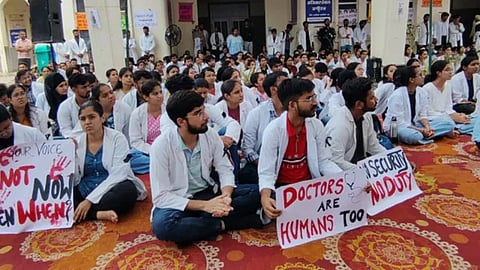

New Delhi, PTI
Four theme-based sub-groups have been constituted on the recommendations of the National Task Force to address the concerns highlighted by the Supreme Court in the wake of protests by doctors following the RG Kar rape and murder incident.
Taking suo motu cognisance of the rape and murder case of a trainee woman doctor at a state-run medical college and hospital in Kolkata, the apex court had constituted a 10-member National Task Force (NTF) to formulate a protocol for ensuring the safety and security of doctors and other health care professionals.
The Union Health Ministry on Thursday issued an office memorandum notifying the four sub-groups of the NTF, each of which have been mandated with four themes -- strengthening infrastructure of medical institutions, strengthening security systems in medical institutions, revamping working conditions of health care professionals and strengthening of legal framework across all states.
"... following four theme based sub-groups are constituted on the recommendations of NTF to address the concerns highlighted and areas suggested by the Hon'ble Supreme Court in its orders dated 20.08.2024 and 22.08.2024," the office memorandum said.
The sub-groups may hold meetings with the stakeholders who have submitted their views on the Ministry of Health and Family Welfare (MoHFW) portal and such other stakeholders. They finalise their recommendations based on such interactions as well as inputs received from the state governments and medical institutions being collated by DGHS through the online portal.
The sub-groups may further give their recommendations along with an action plan to MoHFW in three weeks, which would then be placed before the NTF for finalisation within the timelines set by the Supreme Court, the memorandum said.
In an annexure attached with the memo, the ministry also detailed the terms of reference for the sub-groups according to which it shall formulate effective recommendations to remedy the issues of concern pertaining to safety, working conditions and well-being of medical professionals and other related matters.
The NTF will formulate an action plan based on the recommendations of the four sub-groups categorised under two sub-heads -- 'Prevention of violence against medical professionals and providing safe working conditions', and 'Providing an enforceable national protocol for dignified and safe working conditions for interns, residents, senior residents, doctors, nurses and all medical professionals'.
The terms of reference under the 'Prevention of violence against medical professionals and providing safe working conditions' involves ensuring due security in medical establishments as part of which there has to be triaging in departments and places within the hospital based on the degree of volatility and the possibility of violence, with focus on areas such as the emergency rooms and the ICUs which are prone to a greater degree of violence that need additional security in place to deal with any untoward incident.
It also will look at putting in place a baggage and person screening system at every entrance of a hospital to ensure that arms are not carried inside the medical establishment, preventing intoxicated persons from entering the premises of the medical establishment, unless they are patients, besides training besides training security personnel employed at hospitals to manage crowds and grieving persons.
As far as infrastructural development is concerned, there should be provision of separate resting rooms and duty rooms in each department for male doctors and female doctors, and male nurses and female nurses, and a gender-neutral common resting space.
The rooms must be well-ventilated, have sufficient bed spaces and provide a facility for drinking water. Access to these rooms must be restricted through installation of security devices, the document said.
It calls for adopting appropriate technological intervention to regulate access to critical and sensitive areas including through use of biometric and facial recognition.
The terms of reference include ensuring adequate lighting at all places in a hospital and installation of CCTV cameras at all the entrance and exit points of the hospital, and the corridors leading up to all patient rooms.
If the hostels or rooms of the medical professionals are away from the hospital, there should be provision of transport between 10 pm and 6 am to those who wish to travel to or from their place of stay to the hospital.
There should be employment of social workers trained in grief and crisis counselling at all medical establishments.
Besides, workshops should be conducted for all employees of a medical establishment, including doctors, nurses and helpers on handling grief and crisis and constitution of 'Employees Safety Committees' comprising doctors, interns, residents and nurses to conduct quarterly audits on institutional safety measures.
The terms of reference also mention exploring the possibility of establishing police posts in medical facilities commensurate with the footfall, bed strength and facilities.
Under the other sub-head for 'Providing an enforceable national protocol for dignified and safe working conditions for interns, residents, senior residents, doctors, nurses and all medical professionals', the terms of reference mention prevention of sexual violence against medical professionals.
The document underlined that Sexual Harassment of Women at Workplace (Prevention, Prohibition and Redressal) Act, 2013 applies to hospitals and nursing homes (including private health providers). In terms of the provisions of the Act, an internal complaints committee must be constituted in all hospitals and nursing homes, it said.
The phrase 'medical professionals' encompasses every medical professional including doctors, medical students who are undergoing their compulsory rotating medical internship (CRMI) as a part of the MBBS course, resident doctors and senior resident doctors, and nurses (including those who are nursing interns), the document said.